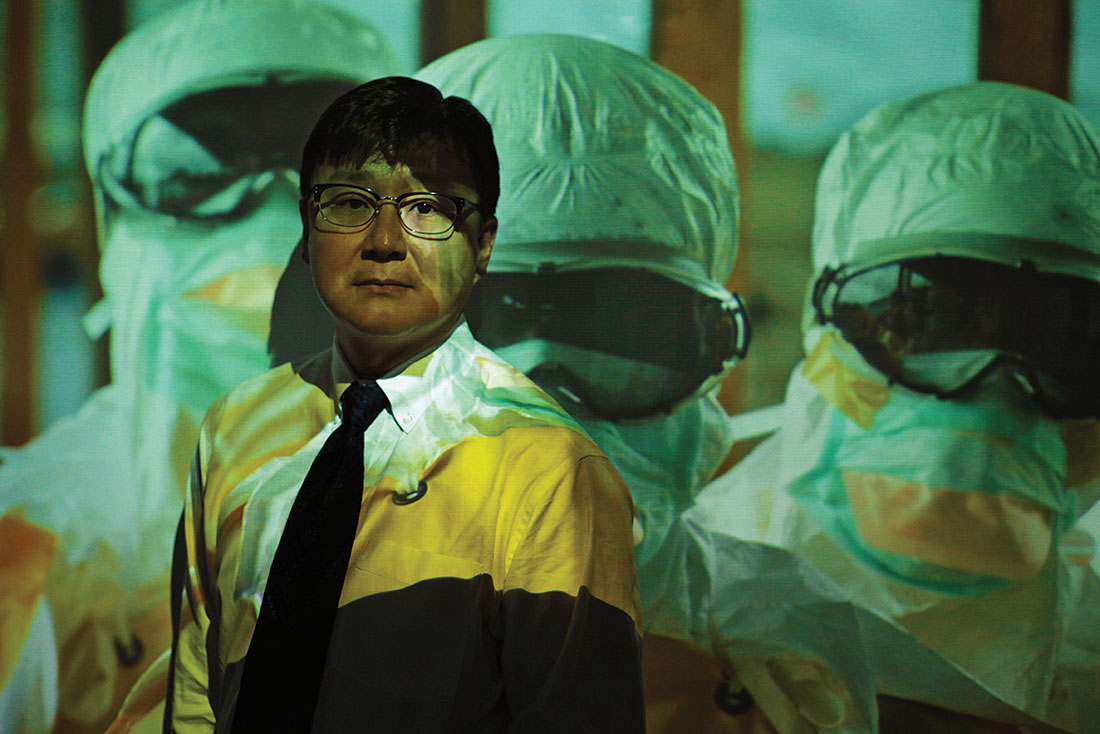
The Contagion of Advocacy
Dr. Han Kim's passion for public health is infectious
by Arikka Von (’15)
Are you sitting down? You might want to because this could get uncomfortable. Dr. Han Kim likes to make people squirm. He begins many of his public health classes by asking students a very personal question. “One of the first things I ask students is, ‘Okay, who pooed this morning?’ And they’re really shy about it. ‘Those of you who pooed, when you flushed the toilet, did you think about where that goes? Next time you poop, I want you to think about it. Watch it swirl around, go down, and think about what happens to that big chunk of poo you just flushed,’” Han recalls with a grin.
Poop can be funny, but it’s also deadly. Han uses humor as an icebreaker, then delves
into the very serious issue of sanitation—especially serious in a global setting.
“I ask students, ‘The last time you had diarrhea, you didn’t think it would kill you,
right? But in Africa and parts of Asia it kills millions of kids every year. The ones
who don’t die have nutritional, cognitive, and many other issues. It’s one of those
things we don’t talk about a lot, but should,” he says.
Han is a passionate advocate for all sorts of global health issues, not what you’d
expect from someone with a degree in mechanical engineering. After graduating from
the University of Michigan, Han had a successful career in the corporate world. He
designed electrical distribution products, got a few patents, and quickly tired of
the corporate grind. So he moved his family to Utah, where he could be a ski bum and
go to medical school. The clinical setting wasn’t a good match either. Han found his
passion lay in the world—keeping it healthy.
After receiving a master’s in public health from the University of Utah and a PhD
in epidemiology from the University of Washington, Han spent six years at the U of
U. In 2008, he came to Westminster, where he could focus less on research and more
on his other passion: teaching.
“I think it’s important for professors to allow students to make their own decisions
based on the evidence. Am I biased in what I present in class? Probably. Everybody
is. But I encourage them to make up their own minds and give them information to talk
about it, and that’s important. You have to talk about these things.”
Han is now director of the Bachelor of Science in Public Health program in the School
of Nursing and Health Sciences at Westminster College. He also leads students through
service learning in Thailand, one of the college’s most popular May Term trips. Whether
it’s in a nursing class, in a refugee camp in rural Thailand, or in an Honors discussion,
Han finds a way to get students comfortable with controversial and difficult topics.
“I tell them, ‘You’re going to be uncomfortable; you’re going to fidget and feel really disgusted. Sometimes you’re going to be really pissed off.’ I tell them that’s part of learning. That’s part of growing. If I’m not pissing you off, if I’m not making you uncomfortable, then I’m not doing my job.”

Han talks a lot about issues that make some fidget in their seats: sex, human trafficking,
vaccines, and colonoscopies—absolutely nothing is off the table.
“Public health is everywhere, and it’s everything. Public health is about getting
to the root causes of health issues. That’s how we prevent disease. Root causes for
many public health issues are social injustices like racism. That really resonates
with students,” Han says.
Han finds himself counteracting the flood of misinformation and the spread of fear
that have led to the anti-vaccination movement and other sensitive topics. He doesn’t
shy away from or mince words about measles outbreaks, genetically modified food, or
HIV and sex. His classes are filled with frank discussions about anal sex, abortion,
and legalized marijuana use—uncomfortable yet? Well, sit down.
When it comes to vaccines, Han is a vocal advocate. But backing his strong opinions
with science and data to support vaccines doesn’t always sway those on the opposite
side.
“We might have to rely on legislation. In public health, we prefer people make their
own choices through education, because individual choices always affect the larger
group. There’s no such thing as a decision you make that only affects you. This is
particularly true with health. A big challenge in public health is the balance between
individual rights and freedoms, and the rights of the community.”
You can bet that kind of talk spurs some lively discussions.
“I think students—including members of the predominant faith in Utah—select Westminster
exactly for that reason. They know when they come here that they are going to be exposed
to a broader cross section of the world than at other institutions. That’s why they
come here: they expect that. And because of that, they grow.”
Han’s students grow into advocates themselves. They come out of his public health
classes with new perspectives, strong opinions, and passionate motivation to create
change.
“I might make them uncomfortable, but it also invigorates them when they realize these
injustices exist. It’s amazing to see Westminster students become passionate advocates
for some of these causes. It makes you incredibly proud to have your students, taught
by you, going off to places like Tulane, Columbia, working for the CDC and the state
health departments. It’s the best way to share part of who you are with the wider
world: through my students.”
Want to catch what Dr. Han Kim has? Follow the Westminster Public Health Facebook
page at facebook.com/pages/Westminster-College-Public-Health.
Facing the Stats:
- Immunization prevents an estimated 2–3 million deaths from diphtheria, tetanus, pertussis (whooping cough), and measles every year—mostly among children (WHO & UNICEF).
- An estimated 27 million people are in labor or sex slavery across the world (US Department of State).
- Approximately 1 million children are exploited by the global, commercial sex trade every year (US Department of State).
- The average age of entry for girls into the commercial sex trade is 12–14 (Polaris Project).
- There are almost 2,000 deaths per day from diarrhea caused by lack of sanitation (UNICEF).
- Vaccines helped reduce measles deaths globally by 78 percent between 2000 and 2008. In sub-Saharan Africa, deaths dropped by 92 percent in the same period (UN Foundation).
- “The more than 150 schools with exemption rates of 8 percent or higher for at least one vaccine were located in census tracts where the incomes averaged $94,500—nearly 60 percent higher than the county median,” (LA Times).
- “Since 1900, the average lifespan of persons in the United States has lengthened by greater than 30 years; 25 years of this gain are attributable to advances in public health,” (Bunker JP, et al. “Improving health: measuring effects of medical care,” Milbank Quarterly 1994;72:225–58).
About the Westminster Review
The Westminster Review is Westminster University’s bi-annual alumni magazine that is distributed to alumni and community members. Each issue aims to keep alumni updated on campus current events and highlights the accomplishments of current students, professors, and Westminster alum.
GET THE REVIEW IN PRINT Share Your Story Idea READ MORE WESTMINSTER STORIES
